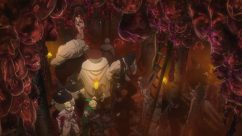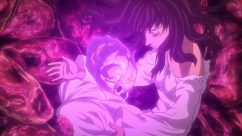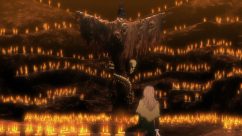Greeting my fellow Berserkers. I know it’s been quite a while since the last post, and it is understandable if you thought that the series has been once again dropped from the blog. But I gave my word that I will see this to the end, and well intend to keep that promise. I originally planned to cover every single episode with its own separate entry, but after completing episode 9’s review came to the realization that due to the action-oriented nature and fast pacing of the episode it became a much shorter post than the previous ones. Hence I planned to do a multi-review that covered both episodes 9 and 10. But between the premier on Friday and tonight I had a series of setbacks that caused another unforeseen delay, and pushed the whole thing back over a few days. But better late than never I guess, so here’s the review to at least catch us up before the release of the semi-final episode.
The Ninth episode starts off with the high priest informing Farnese of her orders to withdraw. We get the Vandimion namedrop yet again, and aside from backstory, this also serves to illustrate the great influence of her family in both the affairs of Midland, as well as the Holy see. The Vandimion family is a noble house of Vritannis, which happens to be the seat of the Holy See. Their standing with the church allows her father to demand her return from the perceivable dangerous situation in Albion. She is hesitant of leaving, and snaps on Serpico, who she rightfully believes to have spied on her on behalf of her father. She hates losing control, and relieves her stress by going off on the only person who would unconditionally follow her. Yet as events unfold she won’t get the chance to comply to her father’s will, even if she was convinced of doing so.
As mozgus tries to “cleanse” Casca in the iron maiden, all hell breaks loose within the basement of the tower, prompting everyone to flee towards the higher levels. The CG used here for the animation of the ectoplasm is actually effective, as it gives the entity an unnatural ghastly quality. It also features a violet hue, which admittedly lightens up the scene quite a bit. Guts, having just entered the tower, kidnaps the only person of authority which he happens to recognize right away, and Farnese is forced to come face-to-face with the source of her misery. It’s strange how Serpico would miss this, given his established sagacity up to this point. Guts doesn’t give Farnese much time to ramble, and again showcasing his ability to make any scene more enjoyable by vicariously carrying out the sentiments of the viewer.
Next we get the displeasure of another scene with Nina wallowing in her misery. These are taken directly from the manga, and although the series has been keeping them brief, they always come off as slightly irritating, to say the least. And then again on mark, Luca comes to her rescue, surely making everyone wish they had someone like her to care for them. At least Nina is aware of her undeserving kindness, making her a bit more sympathetic. She might seem like a hopeless failure, but to be fair, who wouldn’t despair faced with such dire circumstances. Jerome is featured here as well, serving as a reminder that not all knights of the Iron Chain serve the same unreasonable sadistic ideals. Berserk is a mixed bag of characters who inherit different levels of depth and likeability, but at least they are not all made of the same simple mold.
Down in the basement we see that Mozgus is not being so rational, and challenging the creeping phantasm with a ‘come at me bro!’ level of bravado. There’s a quickflash of the Egg Apostle, as he stings Mozgus and his elite torturers with the protruding stingers. I’ve noticed that some viewers had various degrees of confusion regarding this, so I try to clarify the point: Mozgus and the torturers were not apostles. They were just ruthless tools of the Holy See, and it is this quick instance of injection that sires them to the level of Apostle Spawns; similar to the Great Goat of the cave cult. The next scene features a pillar of flame that blasts thru the gate of the cell, which much to my surprise, was animated traditionally.
Luca’s sacrifice of letting go in order to spare Nina, is just one more attempt at resurrecting the proverbial horse so it can be beaten to death once again. Her rescue by the Skull Knight might be a nice surprise to tv viewers, and hence a nice little development. The term she actually uses to describe Skull Knight is ‘Shinigami’, which they translated to “death” in the subs, but most anime fans will recognize to actually mean the Japanese entities known to be gods of death, comparable to the western grim reaper. Given his visage and abilities, I don’t really blame her.
Episode 10 starts off with Guts facing off against the newly-transformed Mozgus party. We’re now starting volume 20 of the manga, again reminding us of how fast the new series has been adapting the manga. I always enjoyed the designs of the Mozgus Apsotle Spawns, but the CG depletes a lot of that charm by obscuring details and making all models simple and symmetric. The undertone of evil beings with angelic features is one that has a longstanding tradition within the Berserkverse, and quite frankly one of the more interesting and subversive aspects of the original manga. This has somewhat been diminished by time and latter imitation, yet it is a testament to the potency of Miura’s iconic style.
After a quick scuffle between the Egg Apostle and the Skull Knight, we see it retreat while managing to snatch Luca at the last moment. I feel that Skull Knight’s hesitation to follow is due to the desire of tracking its lair, and reassuring of its purpose. The Apostle brings Luca to a creepily romantic candlelit vigil by the foot of a Hawk idol made from disposed bodies. It then proceeds to confide in her his backstory as a rejected feral child, that upon coming into the possession of a Behelit, offered the world as a sacrifice in exchange of becoming the Egg of the New World. I personally envisioned him as a twisted child, so it was a bit jarring at first to hear Hiroyuki Yoshino’s voice coming out of him. If he sounds familiar it’s because you have most certainly heard him as a VA in one series or another; given that you’ve watched more than a few anime series. He has done everything from Meow in Space Dandy, to Favaro in Rage of the Bahamut. It doesn’t take long to get used to this however, and instead intrigued by the peculiar order of events that has led to this moment. There is more than just coincidence at work here, and I will hopefully get much deeper into that in the following reviews. Last thing of note in this sequence is the Skull Knight swallowing the Behelit, which comes into play at a crucial moment much further down the line
Next we are taken back to the Tower of Conviction, as a heated battle is taking place between a lonesome Black Swordsman and the entirety of the Mozgus party. This is old news to Souls fans, but I’ll take the moment to note that the original inspirations for the Titanite Catch Pole, Saw Cleaver, and the Logarius’ Wheel are all featured here within the same shot. The choreography is actually nice, but again the editing does its best to make the fight as incomprehensible and disjointed as possible. I will give credit however, that in this one instance the infamous Dragonlayer CLANG! Is used in the right situation for once, as the blade violently clashes against the breaking wheel. The beating that Guts endures after that is frankly quite ridiculous, as that places his durability even beyond some of the Apsotles that we’ve seen in the series, let alone an already beaten up human being. Guts has been brutalized so many times that an X-ray of his chest will resemble that of a suitcase full of dog-treats under the airport’s luggage scanner. Unfortunately this will only get worse as the story continues. The use of the handcannon although predictable, is always satisfying. I however was incredibly disappointed at their portrayal of Guts’ signature canon-spinning-slash, which was damn near impossible to discern through the horrible editing.
Finally, we get to see the camp dissolve into chaos, as the encroaching evil makes it a hellscape that holds back no punches. This escalating horror and familiar imagery is a clear indication of what is about to take place here. We see Mozguz boasting about his powers that he deems as ‘divine’ and calls out for Casca’s burning at the stake to uproot the evil. Unfortunately the CGI phantasm looks much less pleasing here, as the bigger size stretches the textures to a bare minimum. Mozgus says he will be granted a “miracle to defeat the Hawk’s power”. I saw people confused about this line, since the Holy See idolizes the Hawk as a sign of the divinity. They have done a poor job at explaining, but the religion believes in the duality of good and evil, and envision a Hawk of Darkness that stands in opposition to the will of the Hawk of Light. That is what Mozgus is referring to in this instance.
The episode comes to an end as Guts realizes the nature of what is about to happen, and slashes past the augurs of the Godhand to rush and save Casca. I was lucky, as these two episodes were of very equal pacing, content and overall quality. The tone has slightly improved, but continues to be hit-and–miss, with great disparity in quality from scene to scene. I still believe that the use of traditional animation has been on a steady rise, but this only makes the switch to basic CGI models that much more jarring. The next episode is titled “The Shadows of Ideas”, and appears to be the first half of this cour’s finale. This would be a good chance at another dual review, but due to the tardiness of my last few posts I will cover the next episode separately as soon as possible. Expect things to heat up even more, as we move towards the climax of this entire arc. Let’s all hope that it manages to surprise us, and shine a redeeming glimmer of light on the show, instead of further derailing its quality.




